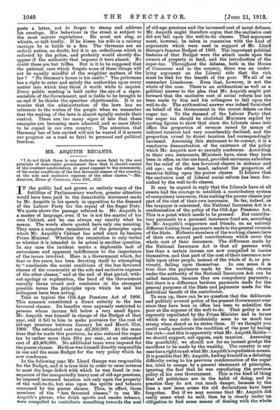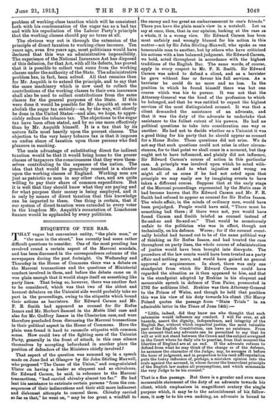MR. ASQUITH RECANTS.
"I do not think there is any doctrine more fatal to the root principle of democratic government than that it should consist of the constant amelioration, at great expense to the community, of the social conditions of the less favoured classes of the country, at the sole and exclusive expense of the other classes."—Ma. ASQUITH, House of Commons, June 12th, 1913.
IF the public had not grown so entirely weary of the futilities of Parliamentary warfare, greater attention would have been paid to the remarkable statement made by Mr. Asquith in his speech in opposition to the demand of the Labour Party for the repeal of the Sugar Duty. We quote above the passage referred to. Mr. Asquith is a master of language, even if he is not the master of his own Cabinet, and he can always say exactly what he means. The words above quoted have only one meaning. They mean a complete recantation of the principles upon which Mr. Asquith's Cabinet has acted since he became Prime Minister. Whether the recantation is only verbal or whether it is intended to be actual is another question. In any case the incident marks a deplorable lack of seriousness and apparent indifference to the importance of the issues involved. Here is a Government which, for four or five years, has been devoting itself to attempting to " ameliorate the social conditions of the less favoured classes of the community at the sole and exclusive expense of the other classes," and at the end of that period, with- out apology or explanation, the head of the Government casually turns round and condemns in the strongest possible terms the principles upon which he and his colleagues have been acting.
Take as typical the Old-Age Pensions Act of 1908. This measure constituted a direct subsidy to the less favoured classes. Its benefits were expressly restricted to persons whose income fell below a very small figure. Mr. Asquith was himself in charge of the Budget of that year, and it fell to him to make provision for the cost of old-age pensions between January 1st and March 31st, 1909. The estimated cost was £1,200;000. At the same time that he made this provision, he also reduced the sugar tax by rather more than fifty per cent., at an estimated cost of £3,400,000. No additional taxes were imposed for the poorer classes. He thus was himself directly responsible in one and the same Budget for the very policy which he now condemns.
In the following year Mr. Lloyd George was responsible for the Budget, and it is true that in order to raise revenue to meet the huge deficit with which he was faced in con- sequence of the unexpectedly heavy cost of old-age pensions, he imposed increased taxation not only upon the property of the well-to-do, but also upon the spirits and tobacco consumed by the poorer classes. Thus, in effect, those members of the " less favoured classes," to use Mr. Asquith's phrase, who drink spirits and smoke tobacco, were compelled to contribute something towards the cost of old-age pensions and the increased cost of naval defence. Mr. Asquith might therefore argue that the exclusive cost did not fall upon the well-to-do classes. That argument must, however, be taken in connexion with the kind of arguments which were used in support of Mr. Lloyd George's famous Budget of 1909. The important political features of that Budget were the attack made upon the owners of property in land, and the introduction of the super-tax. Throughout the debates, both in the House of Commons and in the country, there was an under- lying argument on the Liberal side that the rich must be bled for the benefit of the poor. We all of us' remember Limehouse. Even that, however, is not the whole of the case. There is an arithmetical as well as a, political answer to the plea that Mr. Asquith might put forward that the exclusive cost of social reform has not been made by him and his colleagues to fall upon the well-to-do. The arithmetical answer was indeed furnished on behalf of the Government in the recent debate on the sugar tax. To the demand of the Labour Party that the sugar tax should be abolished Ministers replied by quoting figures to show that since the Liberals came into office the proportion of revenue raised by means of indirect taxation had very considerably declined, and the proportion raised by direct taxation had correspondingly increased. Assuming this statement to be correct, it is a conclusive demonstration of the existence of the policy which Mr. Asquith now so casually condemns. According to their own statements, Ministers have, since they have been in office, on the one hand, provided enormous subsidies for the relief of the less favoured classes in sickness and old age ; on the other hand, reduced the proportion of taxation falling upon the poorer classes It follows that the exclusive cost of Liberal social reform has been fur- nished by the well-to-do classes.
It may be argued in reply that the Liberals have at all events had the courage to establish a contributory system of compulsory insurance, thus making the poorer classes pay part of the cost of their own insurance. So far, indeed, as the taxpayer is concerned, the National Insurance Act is a. condemnation of the policy of the Old-Age Pensions Act. This is a point which needs to be pressed. But contribu- tory payments to a personal insurance fund are, according to Mr. Asquith's supporters and friends, on an entirely different footing from payments made to the general revenue of the State. Hitherto members of the working classes have of their own accord paid contributions which cover the whole cost of their insurance. The difference made by the National Insurance Act is that all persons with less than a certain income are now compelled to insure themselves, and that part of the cost of their insurance now falls upon other people, instead of the whole of it, as pre- viously, falling upon themselves. In one sense it is true that the payments made by the working classes under the authority of the National Insurance Act can be called taxation, because they are compulsory payments ; but there is a difference between payments made for the general purposes of the State and payments made for the individual benefit of the contributor.
To sum up, there can be no question that the deliberate and publicly avowed policy of the present Government ever since they have been in office has been to subsidize the poor at the expense of the well-to-do. That policy is now expressly repudiated by the Prime Minister and in terms which we may note incidentally seem to us much too strong when stated as he states them. If we thought you could really ameliorate the condition of the poor by taxing the rich—and this is apparently what Mr. Asquith thinks— we should support, not oppose, such taxation. Assuming the possibility, we should not for an instant grudge the sacrifices to be made by the wealthy. The country in any case has a right to ask what Mr. Asquith's repudiation means. It is possible that Mr. Asquith, finding himself in a debating difficulty owing to his previous condemnation of the sugar tax, tried to escape by a general statement of principles, ignoring the fact that he was repudiating the previous policy of his own Government. This is the kind of thing that all politicians are in the habit of doing, and in practice they do not run much danger, because by the time a new issue arises the old declarations have been forgotten. But if we may assume that Mr. Asquith did really mean what he said, then he is clearly under an obligation to find some means of dealing with the whole
problem of working-class taxation which will be consistent both with his condemnation of the sugar tax as a bad tax and with his repudiation of the Labour Party's principle that the working classes should pay no taxes at all.
The obvious way out is through the extension of the principle of direct taxation to working-class incomes. Ten years ago, even five years ago, most politicians would have declared that this was an administrative impossibility. The experience of the National Insurance Act has disposed of this delusion, for that Act, with all its defects, has proved that it is possible to collect vast sums from the working classes under the authority of the State. The administrative problem has, in fact, been solved. All that remains then for Mr. Asquith is to extend the principle, and to say that the same machinery which is now used to collect the contributions of the working classes to their own insurance shall also be used to collect contributions from the same classes for the general purposes of the State. If this were done it would be possible for Mr. Asquith at once to abolish the sugar tax entirely—as, by the way, will shortly be done in the United States—and also, we hope, to appre- ciably reduce the tobacco tax. The objections to the sugar tax have been often stated, and by no one more effectively than by Mr. Asquith himself. It is a tax that by its nature falls most heavily upon the poorest classes. The objection to the very heavy tobacco tax is that it imposes an undue share of taxation upon those persons who find pleasure in smoking.
The main advantage of substituting direct for indirect taxation would be that it would bring home to the poorer classes of taxpayers the consciousness that they were them- selves contributing to the expenses of the nation. The idea that that would be generally resented is a slander upon the working classes of England. Working men are just as patriotic as men in any other class, and are quite -willing to pay their share of common expenditure. But it is well that they should know what they are paying and for what purpose their money is being employed, and it is only by means of direct taxation that this knowledge can be imparted to them. One thing is certain, that if our system of direct taxation were extended to every voter in the kingdom Mr. Asquith's recantation of Limehouse finance would be applauded by every politician.











































 Previous page
Previous page